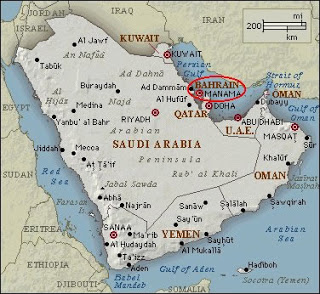Justin Raimondo
Antiwar
Of the new revolutionary eruptions, post-Egypt, perhaps the most problematic for Washington is the upsurge in Bahrain, where a Sunni king has long ruled over his predominantly Shi’ite subjects. King Hamad is a corrupt tyrant whose disregard for basic human rights was underscored by the actions of his security forces in storming a protest encampment in the capital city’s main square, murdering 5 protesters in a surprise assault in the dead of night, and wounding over 200. There are indications that at least some of the assailants were Saudis. Bahrain, a small island kingdom in the Persian Gulf, is connected to Saudi Arabia by a causeway.
In recent years, the government has bowed to American pressure to at least put on a façade of “democratic” reform, but the changes Hillary Clinton praised in her visit to Bahrain a few months ago were merely cosmetic: theelected parliament is still an advisory body, corruption is pandemic, and citizens have no say in how they are governed or by whom. Indeed, it seems that the much-touted “reform” supposedly undertaken in the country at Washington’s request is merely a façade for political manipulation and high-end thievery. In Bahrain, torture of political dissidents is routine.
The protesters aren’t seeking the overthrow of the al-Khalifa monarchy, as far as I can tell: their demands are limited to the firing of King Hamad’s uncle, Sheikh Khalifa bin Salman al-Khalifa, whose term of office as prime minister has dragged on now for 40 years. Sheikh Khalifa, a major landowner, has come to symbolize the ill-gotten gains of the royal family, which virtually owns the entire country outright. As in Tunisia, where the weight of dictator Ben Ali’s family laid heavily on the country’s sinking fortunes – and as in Egypt, too, where the Mubarak clan had some $70 billion socked away in Swiss bank accounts – resentment over this massive thievery has boiled over into revolution.
However, few premonitions of trouble seem to have ever penetrated the walls of our embassy in Manama, the capital, where our diplomats, as recently as December, 2009, reported that everything was coming up roses. One diplomatic cable, brought to us by Wikileaks, tells us the king is “personable and engaging,” and has “overseen the development of strong institutions” — although I doubt the diplomat who wrote that had this in mind. “I’ve just been beaten by a gang of thugs,” said ABC reporter Miguel Marquez as he was assaulted by Bahrain government forces — which just about sums up our position in the region, where we are invariably on the side of the thugs.
Bahrain is a key element of the administration’s strategy against Iran: it is the headquarters of the Fifth Fleet, and will be the linchpin of any future military action in the Gulf by US forces. Simply put, the Empire cannot afford to lose Bahrain. “Bahrain is a friend and an ally and has been for many years,” intones our Secretary of State: “We call on restraint from the government, (and) to keep its commitment to hold accountable those who have utilized excessive force.” The King has promised to investigate the killings – which is like Mubarak promising to investigate the killings committed by pro-government thugs in Egypt. Good luck with that, Hillary.
RELATED ARTICLE:
Obama’s 6 Hypocritical Guidelines For Peaceful Protest



Be the first to comment on "The Battle of Bahrain"